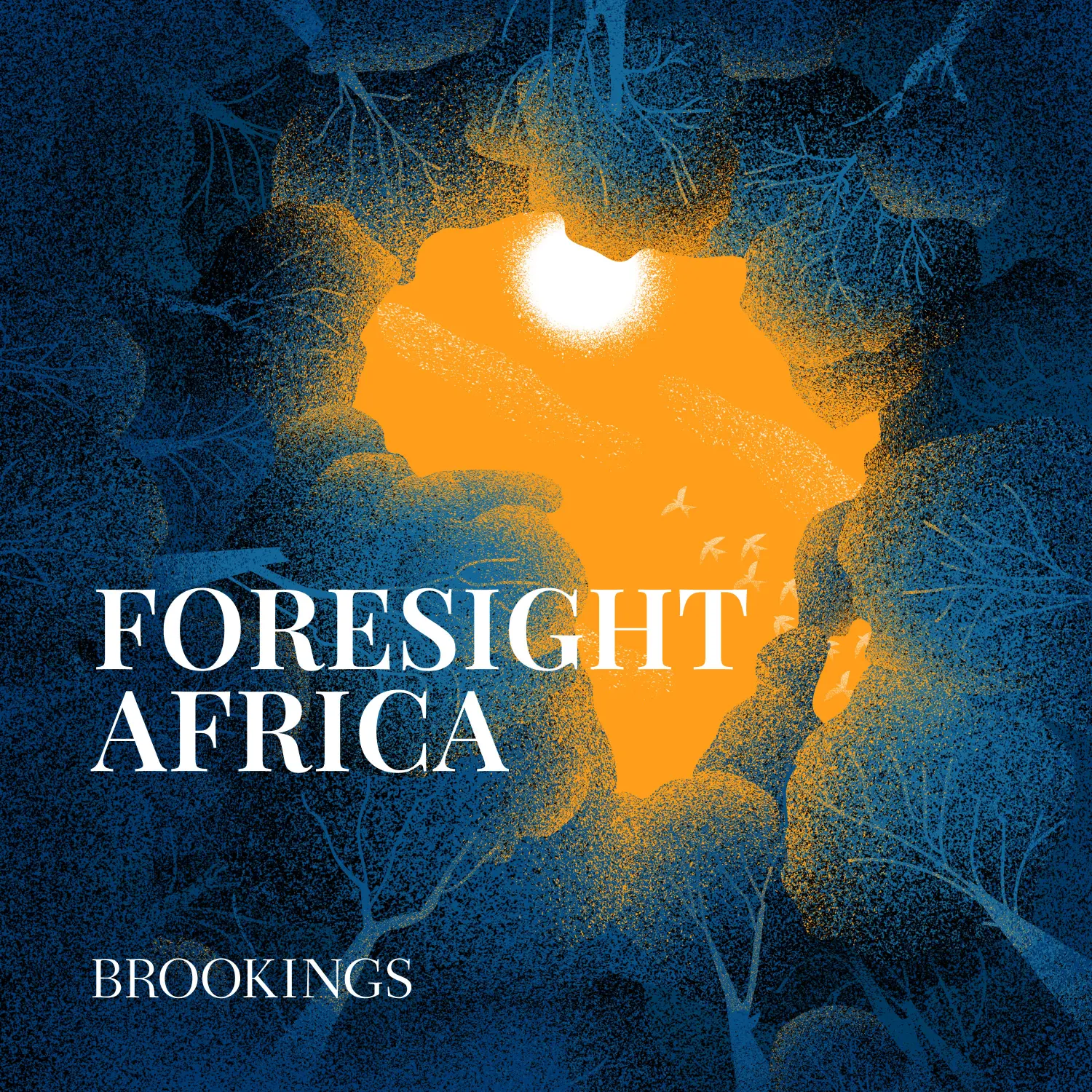This audio recording is part of the World Bank/IMF Spring Meetings 2025 special episode of the Foresight Africa podcast. Listen to the full episode, which includes interviews with six other speakers on site at the event.
Landry Signé, senior fellow in the Global Economy and Development program and the Africa Growth Initiative at the Brookings Institution and host of the Foresight Africa Podcast, engages with distinguished leaders in policy, business, academia, and civil society who share their unique insights and innovative solutions to Africa’s most complex challenges while highlighting the continent’s opportunities to advance impactful engagement between Africa, the U.S., and the global community. During the IMF/World Bank Spring Meetings in Washington, D.C., Signé spoke with high-level officials about their takeaways from the meetings and the impact and potential that international cooperation can have on the global economy.
In this interview, he speaks with Soraya Hakuziyaremye, governor of the National Bank of Rwanda. Prior to joining the National Bank of Rwanda, she was the country’s minister of trade and industry. Hakuziyaremeye has an extensive career in the global banking private sector before her public sector appointments. She is a distinguished alumna of the Thunderbird School of Global Management, where Signé currently serves as professor and executive director of the school’s programs in Washington, D.C.
Transcript
HAKUZIYAREMYE: So, my name is Soraya Hakuziyaremye. I’m the governor of the National Bank of Rwanda, which is Rwanda’s central bank. And prior to that, I had been deputy governor for four years. And prior that, trade and industry minister during the COVID times. So just to show you how challenges and me are one. Thank you so much for having me. It’s a real honor and pleasure.
SIGNÉ: All the honor is ours. So first question, what are the key takeaways from the 2025 Spring Meetings?
HAKUZIYAREMYE: There are many takeaways from the Spring Meetings of both the International Monetary Fund and the World Bank, and from a central bank’s perspective, I think what’s, you know, important was for us, as you know, to get a sense of what the outlook for the economy is globally, but also for our own region, sub-Saharan Africa, and then Rwanda in particular.
And these Spring Meetings come at a time of of great uncertainties—on the economy, geopolitical tensions as we know, trade wars, and announcement of tariffs that have created or heightened uncertainties, as well as at a time where Africa is also in the middle of accelerating its own continental integration.
So when we look at the outlook for the global economy, unfortunately the forecast was not positive because it has been downgraded because of those different tensions and uncertainties. But at least we can be, you know, reassured that sub-Saharan Africa will continue to grow in 2025. Same for Rwanda—we expect a growth in 2025 of around 7%, which is still a very high growth. We expect our inflation to remain within our band, which is between 2% and 8%, and we expect to have inflation around 6.5%. So, so far things look manageable, but the risks to those projections are still on the high side. So we continue to be very vigilant.
And have also been able to engage our partners—multilaterals but also bilaterals—to see how we can continue to build on those strong macroeconomic indicators, to continue growing our economy in a very, very complicated context, making sure that the Central Bank keeps, you know, being on top of its mandate, price stability, financial sector stability, but of course all those headwinds are a risk to that.
So, let’s see what the future holds, but at least we have very good foundations as far as Rwanda is concerned.
SIGNÉ: Amazing! How might the 2025 Spring Meetings shape policy decisions and deliver tangible results across Africa moving forward?
HAKUZIYAREMYE: I think it’s not particular to these Spring Meetings, because we all know what the needs for Africa or emerging economies are. And first and foremost, I think, it was emphasized on by the president of the World Bank, Ajay Banga, is how do we make sure that we create jobs. And that whatever the World Bank is doing, whatever countries are investing in, are actually resulting to jobs. And for Africa, I think that is really important because of our youthful population, but also the opportunities that we want to create on the continent to avoid our best and brightest looking for opportunities abroad.
Second, I think there’s an emphasis on how important it is that reforms that are undertaken are executed faster, that domestic mobilization of revenues is a priority, especially for emerging economies, and Rwanda has been at the forefront of that with the new new tax reforms that were adopted recently. Because we know that there are changes into, you know, aid and development aid, concessional loans will be significantly lower. So it’s important for countries to mobilize their own resources and be able to, you know, be in control of their own destiny. And that’s something that Rwanda has been trying to do all along. Our budget is now at 69% financed by our own revenues, but we need to do more and fast.
Lastly, I think on the financial stability: on the banking sector of Rwanda—we’ve shared this with our counterparts—we have a very sound and stable banking sector with adequate capital and liquidity to weather any shocks. But we know that any external shock might might hamper the stability of that sector. So we are also, I think, and and and it’s one thing that we can say from a policy perspective is being very vigilant, prudent in in terms of how we conduct policies, but for Central Bank the supervisory role is even going to be more important. You have to keep ahead of the times.
But we don’t want to focus only on risks. There are also opportunities, and that has been discussed, on innovation, for instance, in the digital payments space in Africa. How we can enhance, accelerate, but make sure that all our citizens benefit from that. We’ve seen financial inclusion increase rapidly in Africa and in Rwanda in particular, where in the last four years our [formal] financial inclusion rate increased by 15 percentage points from 77% in 2020 to 92% in 2024, but that was driven mainly by mobile money. So we want to build on that access to financial services to make sure that our population get access to insurance products, credit, savings and investment products, to really build resilience.
I think the key word for Africa is building Africa’s economic resilience. It’s a challenge but it’s also opportunities that we need to grab as a continent and make sure that we can leverage on technology, on partnerships, to build really the future that Africa deserves.
SIGNÉ: Incredibly amazing. Thank you so much for joining us today.
-
Acknowledgements and disclosures
The Foresight Africa podcast is brought to you by the Brookings Podcast Network. Send your feedback and questions to podcasts at Brookings dot edu. My special thanks to the production team including Fred Dews, producer; Nichole Grossman, Dafe Oputu, and Nicole Ntungire, associate producers; Gastón Reboredo, audio engineer; and Izzy Taylor, senior communications coordinator in Brookings Global. The show’s art was designed by Shavanthi Mendis. Additional promotional support for this podcast comes from my colleagues in Brookings Global and the Office of Communications at Brookings.
The Brookings Institution is committed to quality, independence, and impact.
We are supported by a diverse array of funders. In line with our values and policies, each Brookings publication represents the sole views of its author(s).




Commentary
Soraya Hakuziyaremye on Africa’s economic resilience—a central bank perspective
Foresight Africa podcast at the 2025 World Bank/IMF Spring Meetings
May 2, 2025